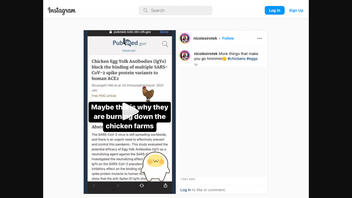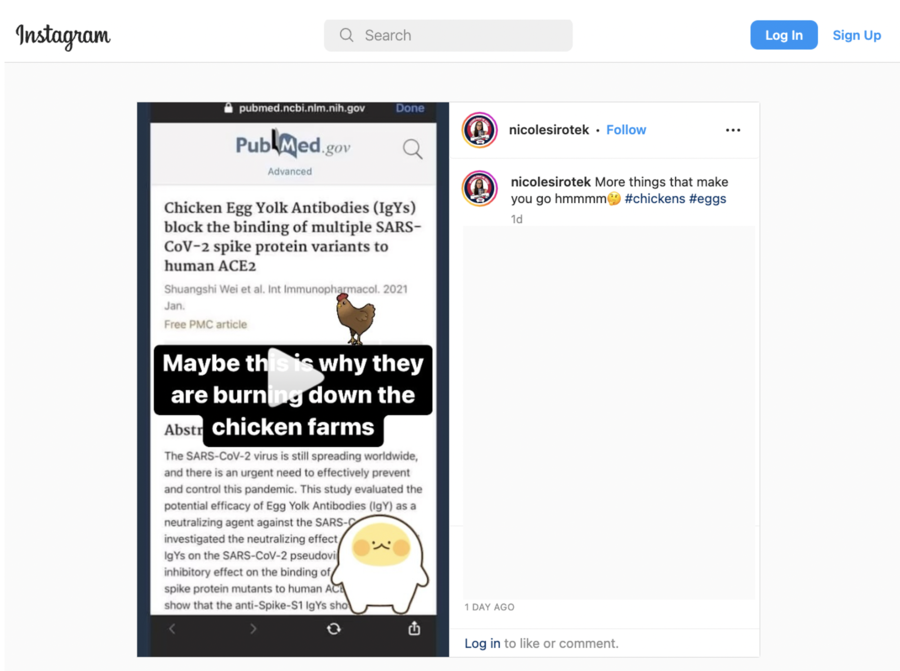
Does a 2020 study published before the approval of any COVID-19 vaccine prove the existence of a conspiracy to burn chicken farms to prevent populations from getting access to eggs that allegedly can protect from COVID? No, that's not true: The study and its conclusions have been significantly misinterpreted, and there is no evidence that eating commercially available eggs affects a person's immune response to coronavirus. The study itself does not recommend egg yolk antibodies as the sole preventative measure against COVID-19.
The claim appeared in a post on Instagram on February 1, 2023. It said:
More things that make you go hmmmm🤔 #chickens #eggs
The caption described a screenshot of a study about antibodies in chicken egg yolk with a superimposed animated GIF. A graphic at the top of the screenshot read:
Maybe this is why they are burning down the chicken farms
Here is what the post looked like at the time of the writing of this fact check:
(Source: Instagram screenshot taken on Fri Feb 3 16:34:10 2023 UTC)
The post appeared to refer to a farm fire in Connecticut that left 100,000 hens dead at the end of January 2023. However, as of this writing, investigators are still working on establishing the cause of the massive blaze. It is unclear whether any wrongdoing took place.
The fire destroyed one of the farms owned by a commercial egg producer not known for involvement in any medical research.
This circumstance makes the cited paper irrelevant: The paper described an experiment conducted in a very specific lab environment, which is not the same as a commercial hen farm.
First published online in November 2020, a month before Pfizer-BioNTech COVID-19 shots became available in the United States under emergency use authorization, the study, conducted by Chinese scientists, tried to explore what it described as a potential "feasible tool for the prevention and control of ongoing COVID-19."
Researchers found that a protein named immunoglobulin Y may act as an antibody in a particular type of egg yolk derived from the "hens that were immunized with the S1 domain of the SARS-CoV-2 spike protein." In contrast, most commercial chickens are only vaccinated against a different avian coronavirus, Infectious Bronchitis Virus (IBV.)
The authors of the study also emphasized that the findings were not tested outside a lab and that more work had to be done to determine whether the proposed method for responding to COVID-19 would be effective in a real-life scenario:
anti-Spike-S1 IgYs showed significant neutralizing potency against SARS-CoV-2 pseudovirus, various S mutants, and even SARS-CoV in vitro ... the safety and efficacy of the IgYs still needs further interrogation in animal models
Long-term control of the SARS-CoV-2, however, will require a combination of active and passive immunization tools, drug therapy, and other preventive measures.
On February 3, 2023, Amir Hadjinoormohammadi, a professor of avian medicine at Australia's University of Melbourne, told Lead Stories via email that there are additional concerns about both the study and the implication that it tells something about the purported protective properties of commercial eggs:
This report has only evaluated the effect of COVID antibodies (raised in chickens by immunisation) on SARS-COV-2 virus culture in a laboratory setting. I am not aware of any report examining the effect of orally administered yolk antibodies on the severity of SARS-COV2 in an animal experimental model, let alone on humans naturally infected with the virus. You also need to be aware that chickens have been found to be refractory to SARS-COV infection.
COVID-19 is an airborne disease. There is no evidence that people can get infected through food and no evidence that "any vitamin, mineral, herb or other botanical, fatty acid, or other dietary supplement ingredient" is capable of preventing or treating the virus.
The Food and Drug Administration (FDA) warns U.S. consumers to be aware of baseless claims about products that may protect them from COVID-19 or cure the virus:
Vaccination is one of the best ways to protect everyone who is eligible from COVID-19. The U.S. Food and Drug Administration has approved two vaccines for the prevention of COVID-19 and issued emergency use authorizations (EUAs) for others. [...]
So far, the FDA has approved only one treatment for COVID-19 and has issued EUAs for others.
Some other vaccines -- for instance, against influenza or yellow fever -- contain egg proteins, but COVID shots do not.
This is not the first conspiracy about a purported connection between vaccines and chickens. In mid-January 2023, some social media users falsely suggested that RNA, a component of COVID shots, could be responsible for a U.S. egg shortage. However, as Lead Stories wrote, commercial chickens do not receive RNA with their food.
Other Lead Stories fact checks of claims about COVID-19 can be found here.














